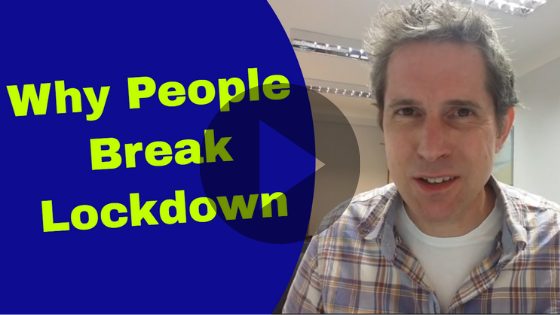Why People Break Lockdown – Hypnotherapy in Ely Vlog
Throughout the coronavirus lockdown, people have been breaking the rules and guidance. In this video, I talk about a psychological bias that may explain a large part of why people have been breaking the lockdown despite the potential health impacts. Click on the image and watch it now:
Why People Break Lockdown:
Hello it’s Dan here. I hope you’re good. Something I’ve been asked about quite a lot recently is about why do people break lockdown rules, what’s going on there, the rules seem clear, we know it’s public safety and health involved, yet lots of people still seem, throughout this process, to have been breaking those rules.
Certainly there could be a number of reasons going on there. Some people might misunderstand the rules, there might be elements of necessity so people feel like they need to support their families and go out and earn money, or for mental health reasons feel that they need get out or to go places or to see people do those kind of things.
Some people who you think might be breaking the rules may in fact not be breaking the rules. Sometimes it’s not that clear cut or it could be key workers doing those kind of things and some people, of course, will just rebel against being told what to do. Perhaps, I don’t want to be too controversial here, but perhaps the Dominic Cummings thing, the them and us thing, might become more and more kind of prevalent as a kind of underlying psychological reason why people are breaking these rules.
Those could be a number of reasons but certainly there’s a psychological element at play in a lot of this stuff. Something like a bias in our thinking, called the optimism bias in which we overestimate the likelihood of positive events, and we can underestimate the likelihood of negative events.
I’ve spoken a lot before here and in my articles. Our mind does a lot of curious stuff, it’s often misplaced, or exaggerates stuff, or has biases, or is just plain wrong. So, I’ve talked about, for example, the spotlight effect where we overestimate how much attention people are given to what we say and do, worrying about what people think, which can stop us doing stuff, the fear of failure and so on. We’ve talked about the illusion of transparency when we assume other people can somehow tell how we feel, when often research and science suggest that that’s not the case. We’ve got things like hedonistic adaptation where we often feel we need to get more stuff, I need new stuff, I need better stuff to make me feel better, make me feel happier, only to find that when you get that stuff, after a while your happiness levels are exactly where they were beforehand.
So, our mind is often misplaced, or exaggerated, or biased in some way. What’s going on here is the optimism bias, and it’s worth pointing out that if you struggle with anxiety, depression, mental health issues, the optimism bias tends not to be a thing. Obviously with depression there can be an element of pessimism about what’s going to happen, with anxiety it tends to feel worry about what’s going to happen, talking broadly there, which means that this kind of psychological bias doesn’t tend to happen.
Certainly if you’re looking at other people and why they’re breaking the rules, why so many people, I think even in the daily briefings they say something like 20% of people admit to breaking them. Certainly where I live I would say it’s other way around, more like 80%, and that’s just from casual observing. It is what it is. But there’s a psychological element going on and what people are not aware they’re thinking is that it’s not going to happen to me.
These kind of things don’t happen to me. We hear it a lot don’t we, people who get ill, accidents happen, misfortune happens, even when good stuff happens sometimes – I never thought I’d be the kind of person who…. So often we’re just misplaced in our thinking. That can apply to all of us but certainly when we talk about these lawbreakers, with people not following the guidance and breaking lockdown, that’s a large element of what’s going on around some of the other stuff.
It’s that kind of I’m not likely to catch it, yet you might, someone like me might, but I think I will be okay and my likelihood is quite low. It’s an issue because obviously breaking lockdown, and breaking the guidance increases the chances of Covid spreading and other people getting it, which can cause illness, can cause death, some people might obviously get mild symptoms.
So it causes issues in that kind of way but it, also, there’s some research that suggests that, if you think your risk of getting it is low, if there isn’t a certain element of fear or concern around it, you’re probably less likely to wash your hands and to maintain social distancing and to do those kind of things, which again increases the likelihood of it continuing to spread and that R number.
So in terms of understanding why people might break the rules, like I say, there can be a number of reasons, but certainly that psychological bias is certainly in play. They think it’s not likely to happen to them, it might happen to other people, might happen to other people similar to them, but they think it’s not going to happen to them. They’re probably not even aware they’re thinking that to a large extent, this kind of bias is kind of there in the thinking in the first place and it’s something I work with clients on.
Sometimes we need to challenge our thoughts, sometimes we need to even just notice what we’re thinking, and to kind of assess it and go, actually is this right, is it logical, is it rational, is there evidence, are there facts for this. It also means in our own thinking the more we can do that, the more we can go, actually is this a thing, what does the science say here, what are the facts saying, and to make better decisions, more rational, logical decisions in that way, the safer we’re going to be, the more likely we are to do the right stuff, washing our hands, keeping a distance, doing things in the right way, the safer we’re likely to be and the sooner we’ll all get through this. A few thoughts there around people breaking the rules. Please do follow them, please do keep you and your loved ones safe, healthy and well and I’ll speak to you next time.
Dan Regan
5th June 2020
Hypnotherapy in Ely & Newmarket
Struggling with anxiety, stress, worry and fear and need some help? Find out how I can help with a Complimentary Hypnotherapy Strategy Session. Learn more here: Appointments
Find out what dozens of other people have said after their hypnotherapy sessions with Dan: Hypnotherapy Testimonials
And check out these powerful hypnosis downloads that can start helping you right away with anxiety, confidence and more: Hypnosis Downloads





0 Comments